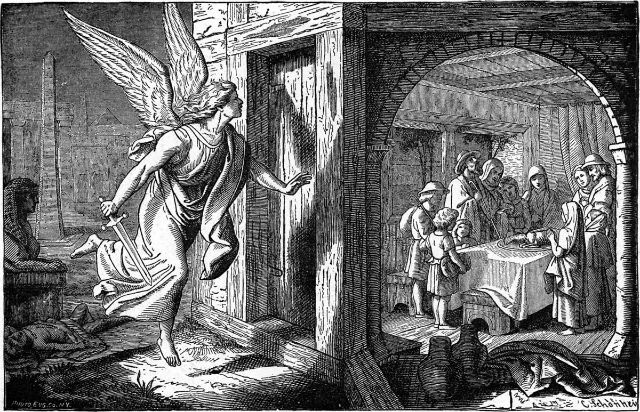All truth comes together in some eternal way. Passover is connected with Easter in a mysterious symbolic way — the rebirth symbolized in Spring, with the birth of lambs and baby chicks, and the return of green everywhere. The seasonal “Spring-cleaning.” We, humans, need a ritual to remember. Otherwise, we get so easily distracted by the wants of the world.
We’ve shared a Passover meal with our Jewish friends. I’ve prepared the Seder plate, and as a family, we have gathered around and talked about the significance of all the items on the plate. Children especially enjoy the symbolism. I know some families have used a chicken bone instead of a lamb shank (that doesn’t work for me.) We use grape juice instead of wine for the kids. We set out a goblet for Elijah as well.
As a family, we’ve watched Cecil B. DeMille’s “The Ten Commandments” during Passover and Easter. I know it’s Hollywood, but I still have fun with it, and I always reflect on my son’s comments when he was a little boy. I had asked him what part he liked best, and he said, “the part when Moses said God parted the waters with a blast from his nostrils.” Yea, that’s the wording:
And with the blast of thy nostrils the waters were gathered together, the floods stood upright as an heap, and the depths were congealed in the heart of the sea. (Exodus 15:8)
Well, now that I brought up nostrils, I have to digress to share something I recently learned about the Hebrew word for nostrils. Believe me, I followed this down a rabbit hole, but I shall try to simplify. You know how some things come together from obscure reading — well, I tried out a Udemy course about Hebrew word study and learned that Hebrew words are concrete words rather than abstract words. However, translators have taken the Hebrew words and turned them into abstract words. For example, the Hebrew word translated as nose or nostrils is אַף (aph). Yet, sometimes it is not translated as nose or nostrils but as anger or angry, depending on the context.
This is because the word aph is derived from the word אָנַף (anaph), a root verb meaning “to be angry.” (Torah Apologetics)
For example,
Genesis 2:7 – Then YHWH Elohim formed man of dust from the ground, and breathed into his nostrils the breath of life; and man became a living being.
Genesis 30:2 – Then Jacob’s anger burned against Rachel, and he said, “Am I in the place of Elohim, who has withheld from you the fruit of the womb?”
In both verses above, the word for “nostrils” is actually the same as the word for “anger:” aph. (ibid.)
The same Hebrew word is aph, but in one context, it means the “flaring of the nostrils” — because that is supposedly describing anger, being angry — flaring your nostrils is maybe how you feel or look when angry. So I am guessing that the Lord was angry — as with a blast of his nostrils, he thwarted the Egyptians from following Moses and His people.
I will have to talk more about the word aph and what it means in other contexts, such as Genesis 2:7 — it is not anger but has something to do with spirit. You have to think about the nose and what it does besides flaring in anger — such as the sense of smell. Sometimes it is used in verses about sacred offerings and the sweet aroma of roasted meat — but later.
I empathize with Moses trying to prepare his people to ascend the mountain of the Lord and then returning to find them frolicking around the golden calf — They weren’t ready to receive the higher law. The things of the world hinder us today as well. Yet, the message is still there for those who have ears to hear. We need to prepare ourselves so that we can ascend the mountain and converse with the Lord.
Further study:






